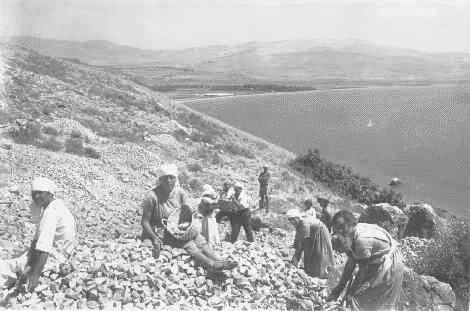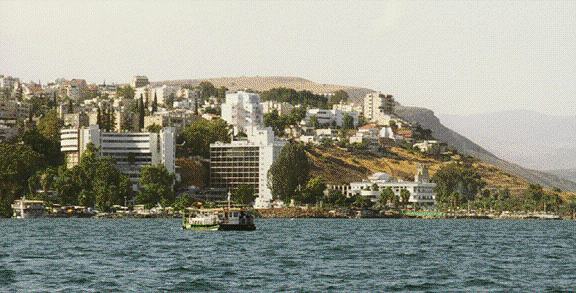Alternative Insight
The Mid-East struggle
Trajectory to Catastrophe
Part II- The Fate of the Israeli Nation
Kibbutz bet Alfa
Source: http://www.wzo.org.il/
Zionists began to arrive at the turn of the twentieth century in the Ottoman province of Palestine with stated worthwhile purposes -- to provide a homeland and to escape from the twin destruction of European Jewry -- assimilation and persecution. The legal justification they sought and obtained for their pursuit did not guarantee stability. For decades, Israel's reach for security has guided itself into a roller coaster of endless conflicts. The fate of the country and its people are gravely threatened. The challenges to its existence have become great.The Challenges
The Arab world continues to threaten Israel
From the time of partition, the Arab nations continually threatened to destroy Israel. Some of their aggressive rhetoric stopped at Camp David I, after which Egypt, and eventually Jordan, signed peace treaties with Israel. Other Arab nations, such as Morocco and Qatar, opened economic and social relations. Israel could not take advantage of these significant breakthroughs and obtain lasting peaceful relations with its Arab neighbors. It is once again challenged by an Arab world that is convinced that Israel's goals conflict with their own nationalist ambitions.
Israel is disoriented
Geographically located in the Mid-East and entirely surrounded by Arab countries, Israel maintains a western orientation. It desires to link itself with the European community (OECD), but the OECD doesn't share geographic problems, economic problems, social problems, etc. with Israel. Israel shares those problems, especially water and refugees, with its Arab neighbors. Its inability to have proper relations with Arab neighbors enhances confrontation. Even if Israel joined in discussions, it would feel submerged by a common Arab culture and methods, which are different from the more industrialized and technologically advanced Israel. In a world in which countries are increasing regional alliances, Israel is being isolated.
Some Arab nations fear Israel is enhancing Islamic fundamentalism
The enduring problem of the Palestinian people has given Islamic fundamentalism a cause. In order to limit Islamic fundamentalist appeals, Arab countries want the Palestinian problem resolved. Israel's failure to equitably resolve the situation disturbs the Arab world.Jerusalem
Israel has firmly stated that "a united Jerusalem is the eternal capital of Israel." Since the Temple Mount only contains mosques and no Jewish structures, the Moslem world interprets Israel's desires to obtain total sovereignty as the first step to modifying the Temple Mount and giving it a Judaic orientation. It is difficult to believe that the Moslems will peacefully allow Israel to gain sovereignty over the Temple Mount or East Jerusalem.
The problems of the West Bank and Gaza defy solution
Israel has had several decades to provide a solution to its occupation of the West Bank and Gaza. The unknown direction that a Palestinian state could take bothers Israel and, to a degree, Jordan. Virulent nationalism could prompt Palestinians to try to join the Hashemite kingdom with a new Palestinian state. The more powerful combined state, coupled with Israel's restless Palestinian population, could pose a threat to Israel.
The task of constructing a distinctly Jewish Nation has become great
During the last fifty three years the Zionist dream experienced a constantly shifting focus. The economy changed from agricultural to industrial and then technological. The religious orientation changed from Zionist secular to a vocal ultra-orthodox influence. The post 1948 immigration of Mid-East and North African Sephardic Jews diluted the original European Zionist culture. The post 1970 immigrations of Russians introduced a culture of lesser Jewish identification. Israel's mission of providing a homeland for the Jewish people is slowly being sidetracked. It is becoming a homeland for an entrepreneurial spirit that is not readily distinguishable from the other capitalist societies of the world.How did the severe challenges that endanger the state of Israel come about? It started with the legal framework that established Israel.
A Legal Framework for the Nation of Israel
A series of international agreements and proclamations gave the Zionists a legal claim to establish a homeland in the ancient biblical land. Similar documents and agreements by the western powers established the nations of Trans-Jordan, Syria, Lebanon and Iraq. The legal documents can be accessed from the following links:Balfour Declaration 2 November, 1917
His Majesty's Government views with favor the establishment in Palestine of a national home for the Jewish people..The League of Nations Mandate for Palestine 1922
The Mandatory shall be responsible for placing the country under such political, administrative and economic conditions as will secure the establishment of the Jewish national home...Peel Commission Report (1937)
Partition secures the establishment of the Jewish National Home and relieves it from the possibility of its being subjected in the future to Arab rule..UN Resolution 181 19 November 1947
A Jewish State covering 56,47% of Mandatory Palestine (excluding Jerusalem) with a population of 498,000 Jews and 325,000 Arabs..Destruction of European Jewry during the Nazi era validated the Zionist thrust. International agreements legalized its position. The accelerating growth from 84,000 Jews in 1922, to 640,000 Jews in 1947, the year of partition, proved the clairvoyance of the Zionist dream. At the same time, the Zionists pursued their national struggle, Arab nations commenced their nationalist struggles. A clash was evident. Israel would know little peace and be forced into an endless drive for security. In the process, Israel achieved insignias of security. Each insignia yielded more challenges and intensified Israel's endless search for security.
Israel's Drive for Security
On May 14, 1948, the Zionist thrust turned from a pioneering effort to an established government that had the obligations to protect its peoples and secure their fate. The Zionists effectively accomplished this role, and emerged from the1948-49 war with the nation intact and its borders extended to a more defensible position. One result -- 750,000 Arab refugees, who were not allowed to return. From Israel's leaders perspective, the country could not incorporate a large minority of Arabs into its shaky foundation.
The Peel Commission envisioned some population transfers and Israel could show precedence from similar situations. Turkey and Greece transferred populations in 1924; India and Pakistan had population transfers; and the Balkan wars resulted in several instances of wholesale population transfers. Israel has been forced to respond to critics because the Palestinian refugee situation had distinguishing features:
- The final 1949 post-war Israel, which consisted of the partition nation and also incorporated captured lands, contained a nation that would have had a majority of Palestinians. A minority created refugees in a majority.
- The Palestinians didn't have their own established country to receive the refugees.. They remained stateless.
- Israelis were not indigenous to the area for a long period of time. Immigrant people made refugees of indigenous people.
Rising Arab nationalism feared that the entrance of European Jews, viewed as representatives of western culture in the Mid-East, would interfere with their advances. The massive amount of Arab refugees from a war in which western oriented Israel demonstrated military superiority alarmed the Arab states. Israel's attempt to contain a problem of diluting the Jewish state, intensified its greatest problem - Arab refusal to accept the new state of Israel.
The 1956 war with Egypt served as a prelude to a wider war. Egypt nationalized the Suez canal in 1956 and provoked France and Great Britain. Egypt's closing of the Suez canal and Straights of Tiran shipping to Israel, provoked the Jewish state. In 1956, Israel, together with France and Great Britain, attacked Egypt. Israel's troops quickly captured the Sinai peninsula and reached the Red Sea but didn't remain for long. President Eisenhower and his Secretary of State, John Foster Dulles, made the three nations retreat from victory. The overwhelming superiority of the Israeli military against the Arab world's strongest country, Egypt, embarrassed and united the Arab world.
The 1956 war brought the world's attention to the explosive quality of the politics in the Mid-East. Israel had tested the efficacy of its armed forces and gained confidence in its performance and in its own security. But it had again increased Arab resentment. The 1956 war led from inflammatory voices of revenge to charges and countercharges of intended aggression to military build-ups to counter aggression and finally to all out war.
Israel's defeat of Arab nations in the 1967 Israel/Arab war left Israel with a major problem -- What to do with its occupied territories? Israel captured and retained large lands - Sinai, Golan, West Bank and Gaza. Its government resolved a potential problem with the Syrian population in Golan by destroying Syrian villages and creating an exodus of ~250,000 persons. A sparsely populated Sinai peninsula did not create much of a problem. The West Bank and Gaza, which contained about 1 million Palestinian people after a post war exodus of 400,000 persons, created huge problems. Israel fought a war to increase its security and inherited a large Arab population and problems that challenged its secure position. The roads through the West Bank were cloudy, treacherous, and mined with uncertainty.
Israel's drive towards ultimate security initiated another drive - the PLO rise to counter Israel and instill in the dispersed Palestinians a collective conscience of a Palestinian nation.The PLO Threat
The PLO, which seemed to be only an ineffective harassment to Israel and a group of misdirected terrorists who were inciting the world against themselves by their tactics, created a national conscience. They accomplished this feat after several paralyzing reversals.Jordan feared the PLO could gain sufficient strength to challenge King Hussein or invite retaliation by Israel against the Hashemite kingdom for harboring the PLO. Jordan crushed the PLO and expelled it to Lebanon.
Jordan's actions did not terminate the PLO's call. Arafat resurrected the PLO from near ruin, gathered support from the world community, and in one of the least heralded and most significant political coup of the twentieth century, convinced the General Assembly of the United Nations in 1974 to recognize the PLO as the representative of the Palestinian people, support their right to self determination and give the PLO observer status at the UN. Israel confronted a more readily identifiable national people that had allies throughout the Arab world and in other countries. Overnight, the challenge to Israel's stability had increased immeasurably. Israel's leaders, already at odds of how to handle the occupation of the West Bank and Gaza, were now uncertain of how to handle the enlarged threat. Israel's leaders agreed on one point -- the PLO had to be neutralized.
The Yom Kippur War and its aftermath
The aftermath of another war with Arab nations prevented immediate action against the PLO and radically changed the direction of the Mid-East struggles. The combined Syrian and Egyptian attack on Israel in 1973 almost succeeded in having those states regain their lands and topple Israel from the international scene. The failure impelled Israel to re-examine its security objectives and Egypt to examine its strategy -- the result, an Egyptian peace initiative that delighted the world. The United States guided Israel into years of deliberations after which Israel returned the Sinai to Egypt for guarantees of peaceful cooperation. The land for peace formula inherent in UN Resolution 242 of 1967, symbolized a new road to Mid-East peace. Israel proved it had security designs and not territorial ambitions. Israel's policy planners differed as to whether that road would lead to sufficient security.After concluding the peace treaty with Egypt, Israel felt that it could not peacefully resolve its threat from the PLO. In 1982, it took action against the PLO in Lebanon and forced its retreat to Tunisia.
After its actions against the PLO, Israel's leaders pondered their policies to its West Bank dilemma and its still hostile Arab neighbors. The succeeding years included rapid economic growth that diverted attention from uncertain and conflicting policies.
The Sea of Galilee
Source:http://www.galen.u-max.com/sea_of_galilee.htmYears of Certain Growth and Uncertain Politics
The hope and enchantment in the years that followed the peace treaty with Egypt and the almost fatal destruction of the PLO have developed into despair. Israel grew rapidly after Camp David. The Zionist dream appeared to becoming true.The economic agility contrasted with a political polarization of Israel society.
The policy planners did not have a coordinated policy towards the occupation in the West Bank and Gaza. One policy, proposed by Moshe Ya'alon, head of military intelligence, consisted of annexation of 35-40% of the territories and self-rule or partnership in the rest of the land on which only the Palestinians were expected to live. Israel strategists did not consider how the Palestinians would live and grow.The Peres Labor government in the1970's started the annexation ball rolling with creeping settlements. Nobody knew where these growing settlements would lead. A merry-go-round of government changes confused the issue. The occupation finally led to increased terrorism and the first Intifada and shattered Israel's complacency. When Arafat on November 15, 1988 proclaimed "the establishment of the State of Palestine on our Palestinian territory with its capital Holy Jerusalem," that implied acceptance of Resolution 242 as the basis for a Middle East settlement, Israel's direction became confused.
The confusion directed strategists to the Oslo peace process. Israel's government remained guided by one word -- security. It tried to use the Oslo peace process to attain security. That was not possible. Security depended upon Israel retaining military presence along all borders with Arab nations, preventing infiltration of supplies and materials to hostile Palestinian groups, and preventing the growth of an antagonistic Palestinian nation. Security depended upon occupation. Peace depended upon no occupation. Israel suffered the consequences of contradictory policies. After decades, Israel still seeks security. After decades, Israel still has terrorism and conflict.
©2001 REUTERS/STR Car bomb attack in JerusalemAn Endless Pursuit for Security
During all of its life, Israel has been driven by one word -- security. It has become more powerful, more prosperous, more rewarding to Jewish people who faced desperation and economic distress. The punishing reality -- each step towards security brought more challenges to achieving security. Israel has not become sufficiently secure to face the future without threat. The Zionists transplanted perceived threats to a dispersed Jewish people, which might have never materialized in the improved climate of the post WWII world, to a centralized location that has made them more vulnerable. Israel prime Minister Sharon has said, "Israel will not negotiate under fire. If it will do that, it will never reach peace. Therefore we have to be very strict in order to reach peace.'' The reality -- Sharon's philosophy has not brought peace or security.President Truman's prophetic words, that he uttered 53 years ago, "Violence and bloodshed will descend upon the Holy Land," are still spoken today. Has time stood still, or are strategists re-circulating worn out documents in an elusive search for Mid-East peace? The world has brought a UN document that the Zionists were too quick to adapt and the growing nationalism in the Arab world would not accept to an ultimate conclusion. Unless Israel can answer its challenges and the world comprehends the realities of the Mid-East struggle, maintaining Israel as a nation of Jewish affirmation and common expression will be forever threatened.
Israel and the Palestinians appear to be trapped into years of unending conflict and grave dangers to their existences.
Go to


